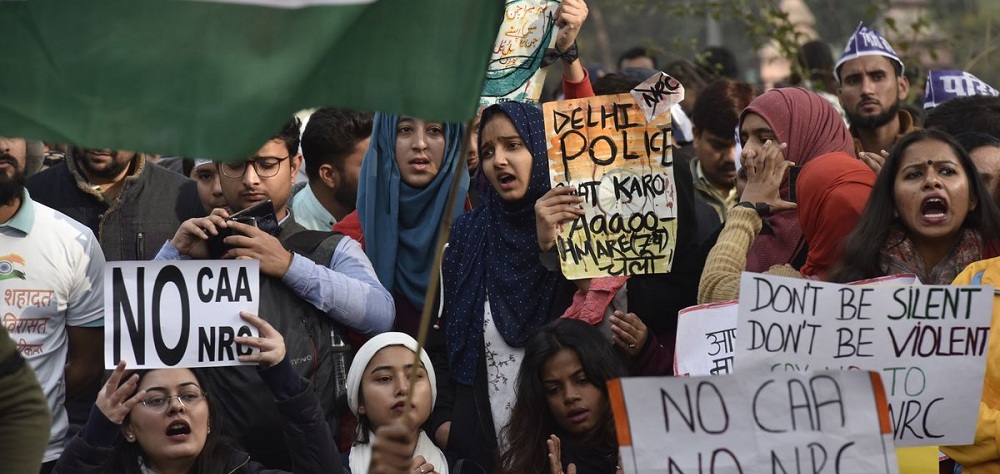Alwaght- Protesters have poured into streets across India to condemn a provocative citizenship law approved this month by the parliament. The demonstrations have led to clashes that have so far killed around two dozens of people.
The protestors argue that from now on around 200 million Muslim Indians, or about 15 percent of the total Indian population, will be marginalized as second-class citizens by the newly-passed law.
The ruling Bharatiya Janata Party (BJP), led by Prime Minister Narendra Modi, raised the bill in the lower house of the parliament. The law faced no serious opposition but from the leftist parties and some regional parties. It was approved by the higher house with a narrow margin as 125 voted for it and 105 voted against it.
Under the law which reviews the conditions of citizenship, such minorities as Hindus, Sikhs, Buddhists, and Christians, and Jains from Pakistan, Bangladesh, and Afghanistan can apply for citizenship. It, however, excludes the Muslim minorities despite the reports about violence against them in some neighboring countries.
Reacting to the law, the United Nations announced that India not only breaches its commitments specified under the international treaties and conventions but also glaringly violates its own constitution with the new citizenship law.
A set of states have asserted that they will not implement the new citizenship law as they find it constitutionally flawed. As a result, the Supreme Court is planned to soon issue a ruling concerning the dispute. The law and popular protests give the opposition parties an opportunity to attack the government of Modi ahead of parliamentary houses elections scheduled for January 2020. Pinarayi Vijayan, the leader of Left Democratic Front, said in the state Assembly Chennithala, that “we are only responsible for the ideals of the Indian constitution. It is a fight against authoritarianism and fascism. The government is using brute force to silence the people who are on the streets against the law meant to divide the people of the country on religious lines. We are not responsible for the fundamentalist and fascist ideology of the Bharatiya Janata Party.”
India has ahead the parliamentary houses elections. The upcoming vote is a big test for the nationalist BJP party and PM Modi.
The leftist parties on Tuesday called for nationwide demonstrations against the new citizenship law. The protests continue, according to reports from various Indian cities.
Over the past two days, the government showed an iron fist to students protesting the new law in two universities of Jamia Millia Islamia and Algarah Muslim Universities, both of which are old higher education centers in the country. In Jamia, the police forces attacked the peaceful students. Reports said the police forces chased the students to the dormitories and libraries and used tear gas there. Footages from the campuses appear to show police forces set fire to university busses. In Algarah, the police vandalized the motorcycles of the students, footage showed.
Upon eruption of the protests, the government shut down internet services in northeast India and regions where anti-government protests were intensive. According to figures, 67 percent of the worldwide internet shutdowns took place in India this year. The internet is shut down in the Jammu Kashmir region 136 days now. Since August 4, protests erupted in the disputed region over a Modi-led move to revoke the autonomy of Kashmir. Kashmir Chamber of Commerce stated that internet outage has caused $1.4 billion damage to the local businesses.
The protests against Modi’s law are backed by opponents of the austerity-affected economic policies of the PM. Opponents of Modi’s policies blast his compliance with the International Monetary Fund demands for structural reforms that require public spending cuts and tax increases to reduce debts. The government seeks to increase by 150 percent of the dormitories’ fees for leading New Delhi universities like Jawaharlal Nehru University (JNC). If implemented, the plan will force at least half of the master’s degree students to drop out.
Modi’s policies are detrimental to the workers and farmers while beneficial to the large businesses. It is no surprise that the labor and farming syndicates have called for public strike on January 8, a call that is expected to bring to the streets hundreds of thousands of farmers and workers.
The concerns and protests made Modi, who talked to his supporters on Monday, attempt to assure the Muslims of the country. He said: "The law does not impact 1.3 billion Indians, and I must assure Muslim citizens of India that this law will not change anything for them.” He added that the government introduces the laws “without religious bias.”
While the government and the PM are struggling to assure that the new law is not anti-Islamic and will not cause bias against the Muslims, Times of India newspaper has reported that the banks from now on may ask people to identify their religion as a result of the law.
Furthermore, the Financial Times newspaper has revealed the “unprecedented crackdown” on the Indian Muslims and predicted that the clampdown campaign may get even worse. The London-based paper held that the Muslim protestors may end up in new jails built by the government. The new law will pave the way for further discrimination against the Muslims who are essentially under Hindu majority pressure.
Now it should be seen if Modi’s administration will walk back from its decision in response to the popular protests, or Indian cities will sink in further violence and unrest as the demonstrations persist.



























